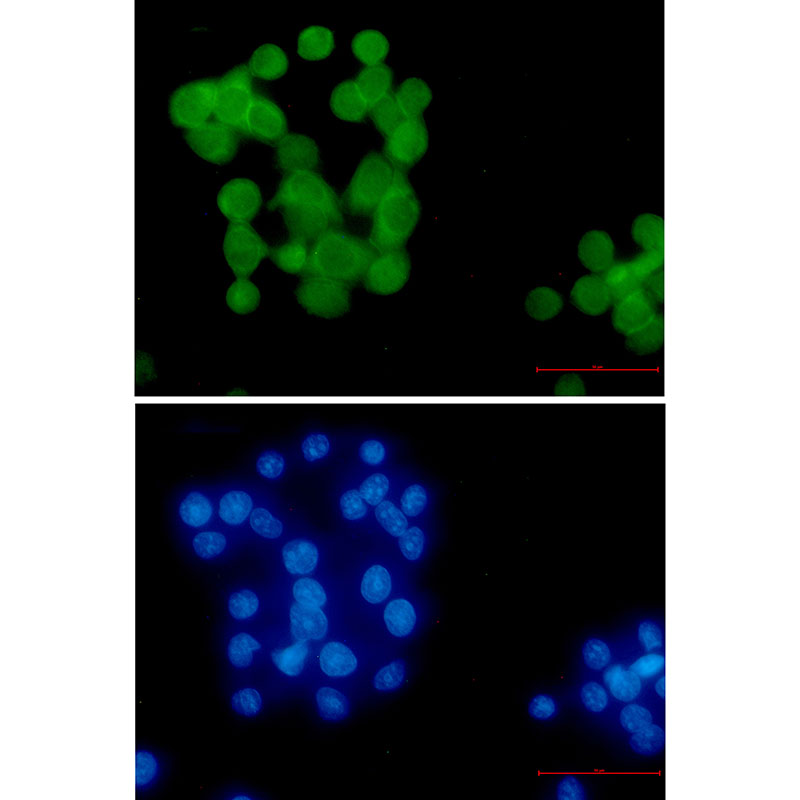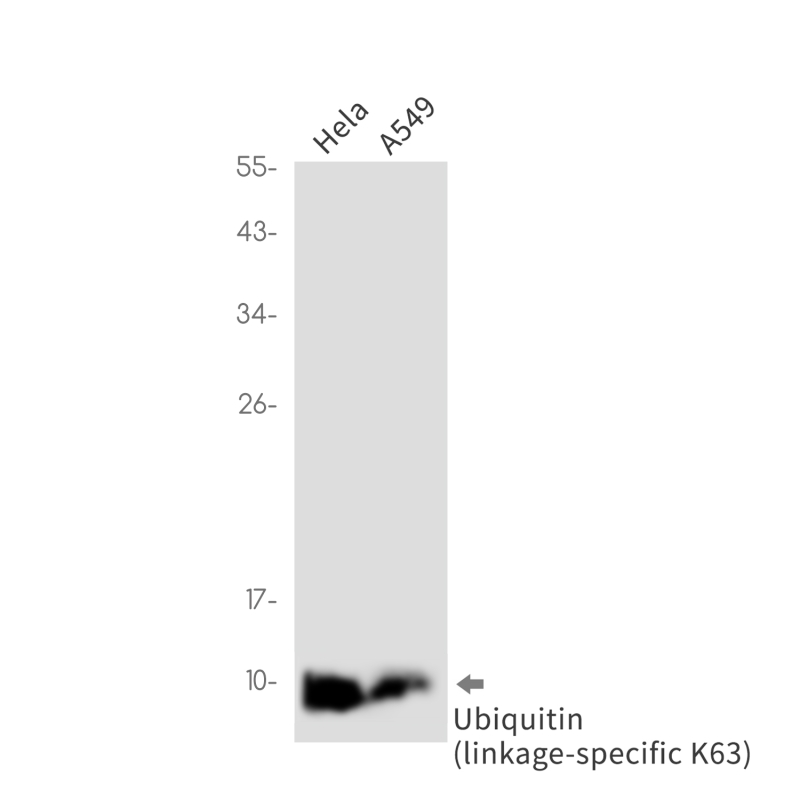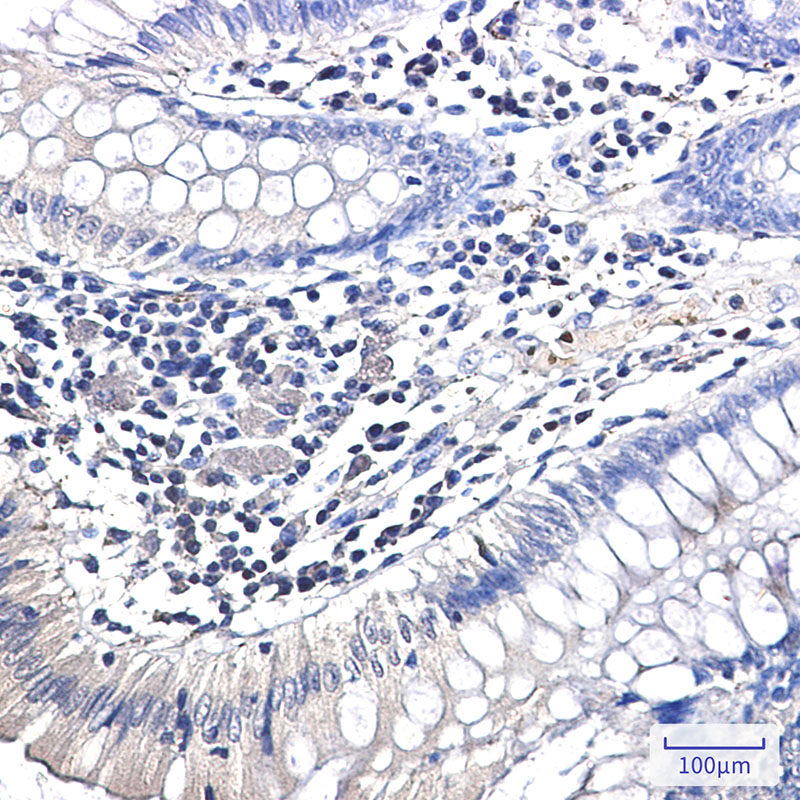


| WB | 1/500-1/1000 | Human,Mouse,Rat |
| IF | 咨询技术 | Human,Mouse,Rat |
| IHC | 1/50-1/100 | Human,Mouse,Rat |
| ICC | 1/50-1/200 | Human,Mouse,Rat |
| FCM | 咨询技术 | Human,Mouse,Rat |
| Elisa | 咨询技术 | Human,Mouse,Rat |
| Aliases | FLJ25987; MGC8385; ubiquitin B; Ubiquitin; UBCEP1; UBCEP2; RPS27A |
| Entrez GeneID | 7314 |
| WB Predicted band size | Calculated MW: 26 kDa; Observed MW: 8 kDa |
| Host/Isotype | Rabbit IgG |
| Antibody Type | Primary antibody |
| Storage | Store at 4°C short term. Aliquot and store at -20°C long term. Avoid freeze/thaw cycles. |
| Species Reactivity | Human |
| Immunogen | A synthetic peptide of human Ubiquitin (linkage-specific K63) |
| Formulation | Purified antibody in TBS with 0.05% sodium azide,0.05%BSA and 50% glycerol. |
+ +
以下是3篇关于K63泛素链抗体的参考文献,涵盖其在信号通路、DNA修复及抗体开发中的应用:
---
1. **文献名称**: *Ubiquitin Chain Editing Revealed by Polyubiquitin Linkage-Specific Antibodies*
**作者**: Komander, D., et al.
**摘要**: 该研究开发了针对K63等泛素链类型的特异性抗体,验证了其在免疫印迹和免疫荧光中的选择性,揭示了K63泛素链在NF-κB信号传导中的关键作用。
2. **文献名称**: *K63-Specific Deubiquitination by Two JAMM/MPN+ Complexes: BRISC and BRCA1-A Complexes*
**作者**: Matsumoto, M.L., et al.
**摘要**: 通过K63特异性抗体,阐明BRISC和BRCA1复合物对K63泛素链的去泛素化机制,及其在DNA损伤修复中的功能。
3. **文献名称**: *Recruitment of the Linear Ubiquitin Chain Assembly Complex Stabilizes the TNF-R1 Signaling Complex and Is Required for TNF-Mediated Gene Induction*
**作者**: Tokunaga, F., et al.
**摘要**: 利用K63泛素链抗体,证实线性泛素链组装复合物(LUBAC)与K63泛素链协同调控TNF信号通路,影响炎症基因表达。
---
这些文献展示了K63抗体在机制研究中的关键作用,包括信号传导、复合物互作及技术开发。如需更多细节,建议通过PubMed或期刊数据库查询全文。
Ubiquitin K63 (Lys63)-specific antibodies are essential tools for studying the role of K63-linked polyubiquitination, a post-translational modification involved in diverse cellular processes. Unlike K48-linked chains, which typically target proteins for proteasomal degradation, K63-linked ubiquitin chains function as signaling scaffolds in pathways such as DNA damage repair, NF-κB activation, endosomal trafficking, and inflammatory responses. These chains are assembled via sequential conjugation of ubiquitin molecules through lysine 63 residues, mediated by E2 enzymes like UBC13 and E3 ligases such as TRAF6 or BRCA1-BARD1.
K63-specific antibodies are designed to recognize the unique structural conformation of K63-linked ubiquitin chains, distinguishing them from other ubiquitin linkage types (e.g., K48. K11). Their development has been critical due to the challenges of isolating linkage-specific signals amid mixed ubiquitination patterns in cells. These antibodies are widely used in techniques like immunoblotting, immunofluorescence, and immunoprecipitation to investigate diseases linked to dysregulated K63 signaling, including neurodegenerative disorders, cancer, and autoimmune conditions. For example, they help elucidate mechanisms in Parkinson’s disease (e.g., Parkin-mediated mitophagy) or TLR/IL-1R-mediated immune activation.
However, antibody specificity must be rigorously validated using ubiquitin chain linkage controls, as cross-reactivity can lead to misinterpretation. Advances in recombinant ubiquitin variants and mass spectrometry have further reinforced the utility of K63 antibodies in decoding context-dependent ubiquitin signaling networks.
×